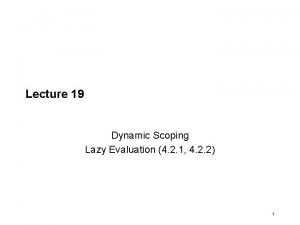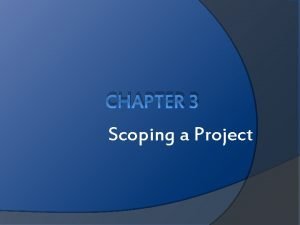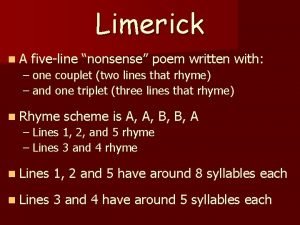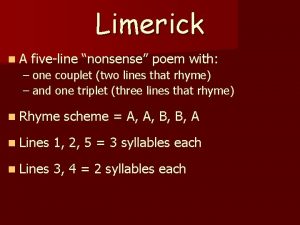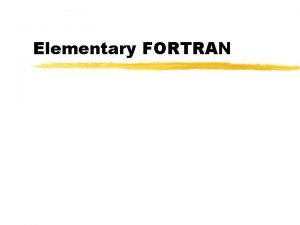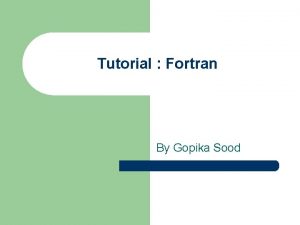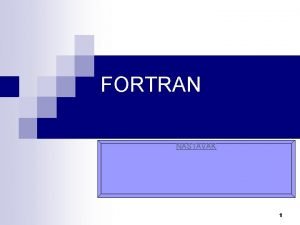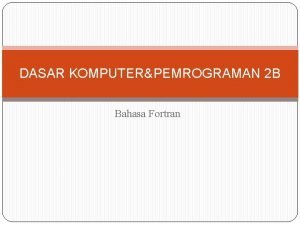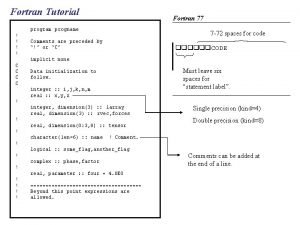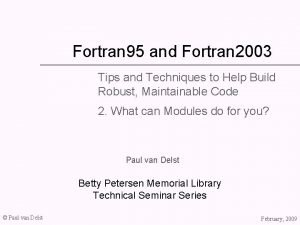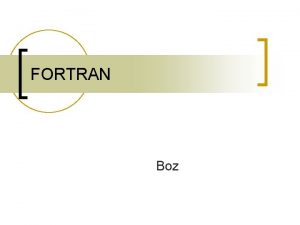Dynamic scoping was a historical nonsense old Fortran



















- Slides: 19


Dynamic scoping was a historical non-sense. old Fortran old Lisp 1960 -70 s they didn’t know how to implement the static scoping! No modern language use dynamic scoping.

Program expression’s values are passed

Is the passed thing through x Memory address? Value in that address? Sometime, we want to pass memory address

Let this be passing address of x. We call it

“Hard to understand, and it seems to use more memory. ” “Does not look exactly like that related to memory. ”

Unified semantics How do we define which values are evaluated for statements (which change only memory)? Integer 0? True? False? Let it be void/empty value, Then how do we make in the program.

They don’t have to be classified differently


let proc f(x) = call f(x) in call f(1) How do we define semantics of recursive call?

Memory cell’s lifetime in our imperative language let x : = 1 in x : = x+1; let y : = 0 in y : = x+1; y : = y-1 end; write x+2 end Memory cell’s life time is equal to its scope. We can check this property against the semantic definition (though hard to formally prove it). This simple property will no longer be true when we extends the language to compute “pointers” & “functions. ”

Not a bad language, I’m happy: -can name memory cells -can name program codes -names with scopes -recursive calls -call-by-value, call-by-reference -for-loops, while-loops -integer I/O But, very primitive for data structures! -can you compute trees? -can you compute cars? -can you compute sets? -yes, but…

In imperative language “Record” means a bunch of memory + naming each location in the bunch Record is very convenient in building non-primitive data structures.

Note: record 값을 메모리주소의 모음 으로 했습니다. Syntax: How to make and use.


We don’t know the lifetime of memory cells in a record by just looking program text. f( let x : = {id : = 8303, weight : = 64} in x end ) x {id: l 1, weight: l 2} l 1 l 2 8303 64 메모리 l 1과 l 2의 수명은 언제 끝날까? More about this later (“memory management”)

eg) let item : = {id : = 200012, age : = 20} in item. id + item. age eg) let tree : = {left: ={}, v: =0, right: ={}} in tree. left : = 1; tree. right : = {left: ={}, v: =2, right: =3}; call add(tree);

Not a bad language, I’m happy: -can name memory cells -can name program codes -names with scopes -recursive calls -call-by-value, call-by-reference -for-loops, while-loops -integer I/O -primitive values: integers, booleans -compound values: records But, should memory be always named? Or, why not - locations as values?

Locations as values E -> | | | … malloc(E) &x | *E E : = E let x : = malloc(1); y : = 0 in *x : = y; x : = &y let x : = in let y : = in x : = end; *x : = write end 0 malloc(1) y 1; *x;
 Dynamic scoping
Dynamic scoping What is problem scoping?
What is problem scoping? Project scoping exercise
Project scoping exercise Project scoping
Project scoping How do you undertake community scoping
How do you undertake community scoping Anglo saxon characteristics
Anglo saxon characteristics Anglo-saxon period in english literature
Anglo-saxon period in english literature Rima baciata schema
Rima baciata schema Five-line nonsense verse
Five-line nonsense verse Scholastic nonsense word test
Scholastic nonsense word test Nonsense mediated decay
Nonsense mediated decay Community and all that nonsense
Community and all that nonsense Free verse poem for kids
Free verse poem for kids Tanka poem generator
Tanka poem generator Esempio di rima alternata
Esempio di rima alternata No nonsense phonics pdf
No nonsense phonics pdf A form of vocal improvisation on nonsense syllables.
A form of vocal improvisation on nonsense syllables. Nonsense poem
Nonsense poem Example of prose
Example of prose Personificazione dell'estate
Personificazione dell'estate
